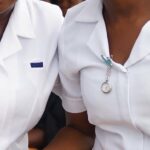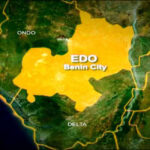
Dorcas Sunday is an expert in agricultural communications. She is a PhD student at the University of Florida in the United States, where she is researching communications that build public trust, improve risk perception, and support behavioural change. In this interview by KINGSLEY ALUMONA, she speaks about her work and life in the US.
How did you come to study agricultural science? Were you a farmer or grew up in a farming household before studying agriculture?
Agricultural science was not my first choice as a child, but it quickly became a purposeful direction for me. It’s a long story. But, like many other children, I wanted to study medical sciences. My mother was a nurse and midwife, and that had an influence on my initial childhood decision to study medical sciences. However, when agricultural science presented the opportunity, I didn’t hesitate. While studying Agricultural Economics and Extension at the Federal University of Kashere, Gombe State, I saw how central agriculture was to Nigerian life, yet how often farmers were underserved when it came to information, support, and access to technology.
While I didn’t grow up as a practicing farmer, I was raised in what I would call a fairly rural setting, where farming was the heartbeat of the community. In Gombe, several families depended on farming for survival, yet many lacked knowledge of improved practices or access to vital resources. Those early observations stayed with me, and they shaped my passion for the human side of agriculture, which is how knowledge is transferred, how farmers make decisions, and how information (or the lack of it) shapes outcomes. I may not have inherited a farm, but I inherited the burden and the vision to make agriculture work better for people.
How was life and work after graduation? Where and what kind of work did you do during your NYSC?
Life after graduation was a blend of uncertainty and determination. Like many graduates, I stepped into a world where jobs were scarce and opportunities had to be actively created or fought for, but I got my first job as a classroom teacher immediately after I graduated. I was redeployed to serve my NYSC in Gombe after camping in Kogi State due to marriage. I was posted to a secondary school to teach agricultural science. Teaching students who had never thought of agriculture beyond subsistence farming gave me a deeper insight into the communication gap that exists in agricultural education and youth engagement.
For my Community Development Service (CDS), I joined the Agro-Allied groups, where we engaged in sensitizing farmers on improved practices, supported small agricultural initiatives within the community, and organized training sessions for youth interested in agribusiness. It was a hands-on experience that further fueled my interest in making agricultural knowledge accessible and applicable to rural communities. We also participated in small-scale tree-planting projects. These engagements shaped my view of community engagement and leadership. It was during that period I began to seriously think about how I could make agricultural knowledge more accessible to underserved communities.
How were you able to secure admission into the University of Florida (UF) in the United States? How are you funding your PhD studies and research at the university?
My journey into UF is an interesting story. I had applied to multiple schools and scholarships over the years, often receiving rejection letters, and rather than give up, I decided to change my approach. I began cold-emailing graduate students and faculty in programmes I was interested in. That was how I connected with a graduate student in Agricultural Communication at UF, who later introduced me to her advisor.
After an initial interview with the professor, I applied for the PhD program. I was offered admission without funding. Then I applied again and later got a graduate assistantship. It didn’t happen overnight, but thank God I eventually got in. What made the difference was the preparation I put into my application. My statement of purpose, my CV, and the clarity of my research interests. Behind all that, there were people whom I had connected with on social media who provided critical feedback and support.
My PhD programme is fully funded through a graduate assistantship, which covers my tuition and provides a stipend. This has made it possible for me to study and conduct research without financial strain. I also manage my living expenses wisely and live modestly. Adjusting to life in the US hasn’t been without its challenges, especially as a mother, but I’m able to cope well with God’s help and a strong support system here at the university.
Which area of agriculture do you specialise in and why? And what impacts are you making in that field?
I specialise in agricultural communication, a young, rare but critical field that focuses on how agricultural information is created, shared, and understood by different audiences, especially farmers, consumers, and policymakers. I chose this path because I strongly believe that how we communicate agricultural knowledge is just as important as the knowledge itself. You can have the best technology or innovation, but if people don’t understand it or trust it, they are unlikely to adopt it.
ALSO READ FROM NIGERIAN TRIBUNE: Tinubu departs Saint Lucia for BRICS Summit in Brazil
My focus is on communication that builds public trust, improves risk perception, and supports behavioural change, especially in the face of crises like disease outbreaks or misinformation. In academia, I have contributed to ongoing conversations around inclusive and strategic science communication. I have had the opportunity to present my research at conferences like the National Agricultural Communication Symposium (NACS) and emerged as the first runner-up for my research poster, at the Association for Communication Excellence (ACE), where I also won two awards; one for outstanding research poster and another as runner-up for research paper. These recognitions affirm the relevance of my work.
I collaborate with the University of Florida’s PIE Center (Center for Public Issues Education in Agriculture and Natural Resources), where we explore how to make research accessible to the public. I have also participated in farm policy visits, educational outreach, and storytelling initiatives. These engagements help me bring a global South perspective to agricultural communication in the US and serve as preparation for the work I hope to lead in the future.
What is your PhD thesis about, and what are the possible findings from it?
My master’s thesis is titled ‘Communicating Science: An analysis of risk perceptions and trust among undergraduate students in the context of an avian influenza outbreak’. In simple terms, I explored how young people perceive risk and decide whether to trust public health and agricultural information, especially during crises like disease outbreaks that affect food systems.
I focused on university students because they are the future workforce and information carriers in society. How they interpret risks, trust sources of information, and react to crises is an important indicator of how well science is being communicated.
I have not officially started working on my PhD thesis yet. That would start after my candidacy exams, and I would be happy to share the insights with you.
How do you deploy your expertise in addressing health and safety issues affecting rural communities in Florida?
My expertise is not in health and safety issues, but I’m currently being trained in communicating agriculture and natural resource issues in my PhD programme. Also through UF’s Center for Public Issues Education (PIE Center), I have contributed to initiatives exploring how diverse audiences respond to agricultural issues like avian influenza and food safety.
I have participated in team discussions, content creation, and audience analysis to improve how scientific and safety information is translated to diverse audiences. These experiences have given me valuable tools I plan to adopt for rural communities and youth engagement in Nigeria.
If you were given a billion naira and a team to ensure food security and the future of food sustainability in the state you come from in Nigeria, how would you go about it?
That would be a great responsibility, and I would approach it in three strategic phases.
Phase 1: Needs assessment and listening. I’m from Oyo State, so I would begin by conducting participatory assessments by working with local farmers, women, youth, and traditional institutions to understand the unique challenges and opportunities in the state. When we talk about food security, we are not only looking at producing more; we are looking at access, resilience, and sustainability. So it is important that we begin by listening.
Phase 2: Integrated interventions. I would invest in equipping extension workers and farmers with updated, localised knowledge using digital and community-based methods; supporting smallholder farmers with seeds, tools, irrigation systems, and storage facilities to reduce post-harvest losses; and launching innovation hubs for agri-tech and entrepreneurship to make agriculture attractive to the next generation.
Phase 3: Communication and market access. I would build a storytelling and information-sharing platform to connect rural producers to urban markets, communicate food safety standards, and amplify farmer voices. This is where my core expertise in agricultural communication would be most visible.
The success of this initiative would not be in how much we spend but in how effectively we engage and empower people at the grassroots using the tools at our disposal.
Apart from your studies, how are you contributing to or impacting the University of Florida community and Florida State generally?
Aside from my academic work, I actively contribute to the University of Florida through leadership, service, and student engagement. I currently serve as the president of the Graduate Student Association (GSA) in my department, where I advocate for student needs, help organise events, facilitate communication between students and faculty, and often support new international students by helping them adjust academically and socially. This position allows me to support my peers, encourage collaboration, and build a stronger academic community.
Also, I’ve had the honour of being inducted into Alpha Tau Alpha Honor Society, a national professional honorary agricultural education organisation that recognises students for their academic excellence, leadership, and commitment to agricultural education.
Through these roles, I contribute to shaping how agricultural issues are discussed and understood within the university and the broader Florida community. Whether through mentorship, public engagement, or collaborative projects, my goal is always to make knowledge more meaningful and accessible and my background allows me to contribute unique perspectives on how science can be communicated in ways that truly resonate with people and influence decision-making.
What is your advice to Nigerians planning to study or live in the US?
Studying or living in the US is an opportunity that will challenge you and help you grow mentally, emotionally, and professionally. Do your research. Understand the schools, deadlines, programs, and what is expected of you. Build a compelling personal story in your application, not just a list of grades or qualifications. Reach out to those ahead of you who can offer guidance. Many opportunities often come through the right information and networks.
Once in the US, stay grounded and focused, and be open to learning new ways of thinking and working. Ask questions, speak up when necessary, and take responsibility for your journey. And most importantly, represent yourself well. Let your work and attitude speak for you.
WATCH TOP VIDEOS FROM NIGERIAN TRIBUNE TV
- Let’s Talk About SELF-AWARENESS
- Is Your Confidence Mistaken for Pride? Let’s talk about it
- Is Etiquette About Perfection…Or Just Not Being Rude?
- Top Psychologist Reveal 3 Signs You’re Struggling With Imposter Syndrome
- Do You Pick Up Work-Related Calls at Midnight or Never? Let’s Talk About Boundaries






